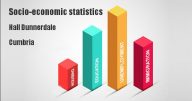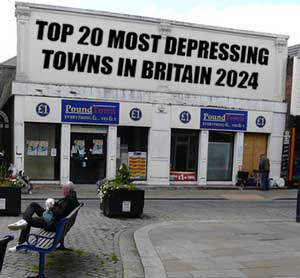We have collated a series of socio-economic statistics for Hall Dunnerdale in Copeland from UK government sources such as the 2021 Census and the Index of Multiple Deprivation. They should give you a broad snapshot of the area and the surrounding locations. Are the residents of Hall Dunnerdale older than the national average or younger? What is the population of Hall Dunnerdale and Copeland? Is Hall Dunnerdale an unemployment hotspot? This page should provide you with the answers.
What are the occupations of the residents of Hall Dunnerdale?
The largest employment sector in Hall Dunnerdale is Managers, Directors & Senior Officials. The smallest employment sector is Elementary Occupations.
| Sector |
Proportion |
| Managers, Directors & Senior Officials |
% |
| Professional Occupations |
% |
| Associate Professional & Technical |
% |
| Administrative & Secretarial |
% |
| Skilled Trades |
% |
| Caring, leisure & Other Services |
% |
| Process Plant & Machine Operatives |
% |
| Elementary Occupations |
% |
Hall Dunnerdale Health Statistics
| Area |
VG |
G |
F |
B |
VB |
|
0% |
0% |
0% |
0% |
0% |
|
0% |
0% |
0% |
0% |
0% |
|
0% |
0% |
0% |
0% |
0% |
|
0% |
0% |
0% |
0% |
0% |
VG = Very Good, G = Good, F = Fair, B = Bad & VB = Very Bad
Hall Dunnerdale Unemployment Statistics
Since the introduction of Universal Credit, The Department for Work & Pensions have not issued any statistics (in our view) that can be used to ascertain the levels of unemployment or under employment in the UK, just meaningless geographic counts. However, the Office of National Statistics does publish claimant counts of people receiving out of work benefits, be that legacy Jobseeker’s Allowance or Universal Credit as a proportion of people over 16. These figures are usually updated once a month and are for Local Authority Districts and Unitary Authority Districts. So below are the figures of .
| Area |
Unemployed |
Yearly Change |
|
% |
% |
|
% |
% |
|
% |
% |
| UK |
3.7% |
-0.3% |
The 2021 census had data on people who were economically active (seeking work) yet unemployed on Census day (Sunday March 21st 2021). These statitics do cover Hall Dunnerdale on a ward level. However, it has to be noted that the Census day was during the height of the Covid19 pandemic and therefore are not reflective of normal levels of unemployment. For example, between March 2020 and June 2020 people claiming Universal Credit doubled in most areas of the United Kingdom and then steadily declined up to the day of the Census and beyond. This data also contains the proportion of people in part-time work (working between 1-35 hours per week), which maybe an indicator of under employment in Hall Dunnerdale.
| Economic Status |
Proportion |
| In Employment |
0% |
| In Part-Time Work |
0% |
| Unemployed |
0% |
100% of the people in work, are in full-time employment in Hall Dunnerdale
Hall Dunnerdale Age Distribution Statistics
We have taken the raw data from the 2021 Census and the calculated the proportion of age groups in .
| Age Band |
Proportion |
| 4 & under |
 |
| 5 - 9 years |
 |
| 10 - 15 years |
 |
| 16 - 19 years |
 |
| 20 - 24 years |
 |
| 25 - 34 years |
 |
| 35 - 49 years |
 |
| 50 - 64 years |
 |
| 65 - 74 years |
 |
| 75 - 84 years |
 |
| 85 years & over |
 |
How many residents own or rent their home in Hall Dunnerdale and
We have taken the raw data from the 2021 census and calculated what proportion of people in Hall Dunnerdale either own or rent their home. All percentages have been rounded to two decimal places. 0 of residents own their home either outright or mortgaged. 0 of Hall Dunnerdale residents rent their home either privately or through a social landlord.
| Area |
Owned |
Rented |
|
0% |
0% |
|
0% |
0% |
|
0% |
0% |
|
0% |
0% |
Hall Dunnerdale has a higher level of home ownership than than the national average.
Hall Dunnerdale compared to other wards in
Hall Dunnerdale is ranked out of 0 wards in for the percentage of home owners.
Hall Dunnerdale Education Statistics
We have taken the raw data from the 2021 census to found of the level of education Hall Dunnerdale residents have in terms of formal qualifications as a percentage. The UK government breaks qualifications down into 7 levels. A detailed explanation of these levels can be found here. However, the Census groups these into just 4 \'levels\'. Here are some examples of the qualifications each census level represents when not stated;
- Level 1 - GCSE grades D, E, F, or G & below
- Level 2 - GCSE A*, A, B, C or O Level grades A, B or C
- Level 3 - A or AS qualification at any grade
- Level 4 - HNC, Bachelors Degree, Masters Degree or Phd
In this first table we have compared Hall Dunnerdale to the national average for .
| Level |
|
|
| No Qualifications |
0% |
0% |
| Level 1 |
0% |
0% |
| Level 2 |
0% |
0% |
| Apprenticeship |
0% |
0% |
| Level 3 |
0% |
0% |
| Level 4 |
0% |
0% |
Hall Dunnerdale & Immigration Statistics
We have analysed the Census 2021 raw data on country of birth and compiled immigration statistics as percentages of the population. All percentages have been rounded to two decimal places. Below are the figures for Hall Dunnerdale in the local area district.
| Area |
Born in UK |
Born outside UK |
|
0% |
0% |
|
0% |
0% |
|
0% |
0% |
|
0% |
0% |
Hall Dunnerdale compared to other wards in
| # |
Ward |
Born in UK |
Born outside UK |
';
Hall Dunnerdale is ranked out of 0 wards in for the number of residents born outside of the UK.
What is the population of Hall Dunnerdale and Copeland?
The table below contains the populations figures for each ward in Copeland including Hall Dunnerdale. These population ONS figures are estimated are dated Mid 2020.
| Ward |
Population |
| Arlecdon & Ennerdale |
4471 |
| Beckermet |
2488 |
| Black Combe & Scafell |
4251 |
| Cleator Moor |
6723 |
| Corkickle |
2151 |
| Distington, Lowca & Parton |
3901 |
| Egremont |
5829 |
| Gosforth & Seascale |
3990 |
| Hillcrest |
5070 |
| Kells |
2259 |
| Millom |
5761 |
| Moor Row & Bigrigg |
2384 |
| Moresby |
1756 |
| Sneckyeat |
2394 |
| St Bees |
1902 |
| Whitehaven Central |
5270 |
| Whitehaven South |
7441 |
| Copeland Total |
68041 |
Last updated: 20/02/2024, Additional Sources: Office for National Statistics & Department for Work & Pensions.
How grim is your Postcode?













